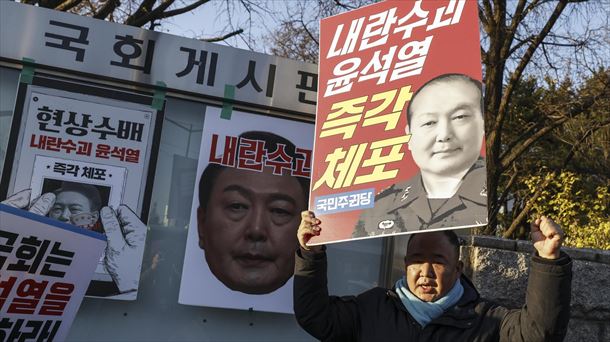The United States proposes an “ambitious climate action” in the region to combat global warming and a new approach to the migration crisis
“Let’s get to work building the future this region deserves.” With these words, the President of the United States, Joe Biden, opened the ninth Summit of the Americas this Thursday. The region is “large and diverse” and not all countries “always agree on everything”, but disagreements must be resolved with “mutual respect and dialogue,” the White House leader snapped. How? With the “distinctive stamp of the region”: democracy.
“At a time when democracy is under attack around the world, let’s come together and renew our belief that democracy is the essential ingredient for America’s future,” Biden said in the opening address after the greeting, along with his wife Jill. to more than twenty heads of state. He also met Brazilian Jair Bolsonaro, with whom he discussed the importance of holding ‘free elections’.
Washington focused on global warming, for which it wants to “build a sustainable partnership.” The Vice President, Kamalla Harris, launched the US-Caribbean partnership to tackle the climate crisis, due to the region’s vulnerability to rising sea levels. And it is this region, with immense natural resources, that has suffered this crisis.
But the Biden administration doesn’t want to stop there. It will also “provide support” to Brazil, Colombia and Peru through Amazonia Connect, which was launched at the Glasgow Climate Summit, to reduce deforestation.
The White House expects Barbados, Jamaica, Guyana, Brazil and Argentina to be included in the renewable energy project for Latin America and the Caribbean, which consists of 15 countries. The intent is “to reach the collective target of 70% renewable energy in the electricity sector by 2030,” Harris said. To that end, he announced that the US is coordinating with four regional development banks the availability of up to $50,000 million over the next five years to “support ambitious climate action.”
This Friday, Biden will present a “new innovative and integrated approach to managing migration and responsibility sharing across the hemisphere”. This is where the controversy is served, as Mexico’s presence is key to dealing with this crisis, but it refused to participate because the United States had not invited Cuba, Nicaragua and Venezuela, considering them dictatorships. Havana confirmed that the summit will not have an “effective outcome” and warned that the migratory flow will continue.
On the other hand, the US president spoke by phone with Juan Guaidó, whom he did not invite to the summit despite his support as interim president of Venezuela, and confirmed his willingness to “calibrate the sanctions” if a negotiated solution to the crisis is found. reaches. favored, leading to free elections.
Source: La Verdad
I am an experienced and passionate journalist with a strong track record in news website reporting. I specialize in technology coverage, breaking stories on the latest developments and trends from around the world. Working for Today Times Live has given me the opportunity to write thought-provoking pieces that have caught the attention of many readers.



